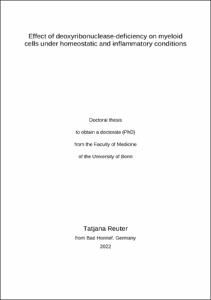Reuter, Tatjana: Effect of deoxyribonuclease-deficiency on myeloid cells under homeostatic and inflammatory conditions. - Bonn, 2022. - Dissertation, Rheinische Friedrich-Wilhelms-Universität Bonn.
Online-Ausgabe in bonndoc: https://nbn-resolving.org/urn:nbn:de:hbz:5-69329
Online-Ausgabe in bonndoc: https://nbn-resolving.org/urn:nbn:de:hbz:5-69329
@phdthesis{handle:20.500.11811/10546,
urn: https://nbn-resolving.org/urn:nbn:de:hbz:5-69329,
author = {{Tatjana Reuter}},
title = {Effect of deoxyribonuclease-deficiency on myeloid cells under homeostatic and inflammatory conditions},
school = {Rheinische Friedrich-Wilhelms-Universität Bonn},
year = 2022,
month = dec,
note = {In healthy and diseased individuals, endogenous nucleic acids are present in various forms and need to be processed and cleared. Failed clearance of DNA is associated with an autoimmune disease termed systemic lupus erythematosus (SLE), which is characterized by systemic inflammation affecting multiple organs including kidney and lung. In SLE patients and lupus-prone mouse models, myeloid cells contribute to the immune-mediated pathology and recognition of DNA-derived products drives their activation. In contrast, detection of DNA-derived products can contribute to the survival, proliferation and differentiation of myeloid cells resulting in cancer-like cell expansion also termed histiocytosis.
The aim of this thesis was to investigate how the loss of DNA-degrading enzymes influences myeloid cell populations under homeostatic conditions and what effects these changes have under inflammatory conditions. Therefore, multiple deoxyribonuclease-deficient mice including DNase1-/-, DNase1l1-/-, Dnase1l2-/-, DNase1l3-/- and Pld3-/- mice were generated. While in DNase1-/- and DNase1l2-/- mice elevated numbers of patrolling monocytes were found, loss of Dnase1l1 and DNase1l3 led to the expansion of monocyte-derived cells expressing MHC class II. Pld3-/- mice developed splenomegaly accompanied by an expansion of diverse monocyte populations. But apart from enlarged spleens, no gross pathological manifestations could be observed. Since the effects of the cellular alterations were not apparent, deoxyribonuclease-deficient individuals were treated with a compound termed pristane that induces cell death and boosts the release of self-DNA. Besides, pristane is known to induce renal and pulmonary SLE-like complications. Surprisingly, it has been discovered that the loss of DNase1 protects against the development of severe pulmonary hemorrhages after pristane challenge, whereas deficiency of DNase1l1, Dnase1l2 and DNase1l3 did not affect disease progression. In contrast, Pld3-deficiency aggravated pathological manifestations. Since myeloid cells contribute significantly to the development of pristane-induced pulmonary hemorrhages, diverse populations in the peritoneum – the initial site of inflammation – and lung – the site of bleeding – were examined. In addition, the involvement of two DNA sensors, which are associated with the manifestation of SLE-linked complications, was investigated. Pristane-challenged Tlr9-/- mice were partially while Sting-/- mice were primarily protected from severe lung injuries, suggesting that both DNA sensors are involved in the development of alveolar hemorrhage.},
url = {https://hdl.handle.net/20.500.11811/10546}
}
urn: https://nbn-resolving.org/urn:nbn:de:hbz:5-69329,
author = {{Tatjana Reuter}},
title = {Effect of deoxyribonuclease-deficiency on myeloid cells under homeostatic and inflammatory conditions},
school = {Rheinische Friedrich-Wilhelms-Universität Bonn},
year = 2022,
month = dec,
note = {In healthy and diseased individuals, endogenous nucleic acids are present in various forms and need to be processed and cleared. Failed clearance of DNA is associated with an autoimmune disease termed systemic lupus erythematosus (SLE), which is characterized by systemic inflammation affecting multiple organs including kidney and lung. In SLE patients and lupus-prone mouse models, myeloid cells contribute to the immune-mediated pathology and recognition of DNA-derived products drives their activation. In contrast, detection of DNA-derived products can contribute to the survival, proliferation and differentiation of myeloid cells resulting in cancer-like cell expansion also termed histiocytosis.
The aim of this thesis was to investigate how the loss of DNA-degrading enzymes influences myeloid cell populations under homeostatic conditions and what effects these changes have under inflammatory conditions. Therefore, multiple deoxyribonuclease-deficient mice including DNase1-/-, DNase1l1-/-, Dnase1l2-/-, DNase1l3-/- and Pld3-/- mice were generated. While in DNase1-/- and DNase1l2-/- mice elevated numbers of patrolling monocytes were found, loss of Dnase1l1 and DNase1l3 led to the expansion of monocyte-derived cells expressing MHC class II. Pld3-/- mice developed splenomegaly accompanied by an expansion of diverse monocyte populations. But apart from enlarged spleens, no gross pathological manifestations could be observed. Since the effects of the cellular alterations were not apparent, deoxyribonuclease-deficient individuals were treated with a compound termed pristane that induces cell death and boosts the release of self-DNA. Besides, pristane is known to induce renal and pulmonary SLE-like complications. Surprisingly, it has been discovered that the loss of DNase1 protects against the development of severe pulmonary hemorrhages after pristane challenge, whereas deficiency of DNase1l1, Dnase1l2 and DNase1l3 did not affect disease progression. In contrast, Pld3-deficiency aggravated pathological manifestations. Since myeloid cells contribute significantly to the development of pristane-induced pulmonary hemorrhages, diverse populations in the peritoneum – the initial site of inflammation – and lung – the site of bleeding – were examined. In addition, the involvement of two DNA sensors, which are associated with the manifestation of SLE-linked complications, was investigated. Pristane-challenged Tlr9-/- mice were partially while Sting-/- mice were primarily protected from severe lung injuries, suggesting that both DNA sensors are involved in the development of alveolar hemorrhage.},
url = {https://hdl.handle.net/20.500.11811/10546}
}






